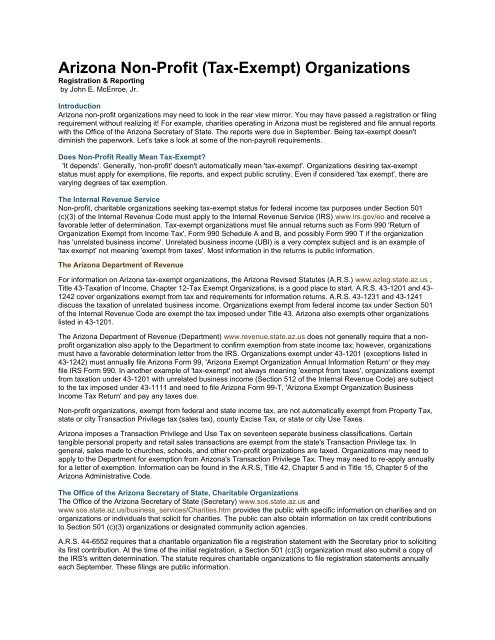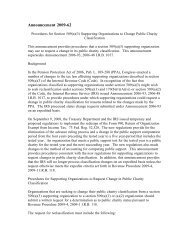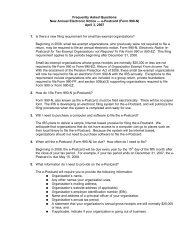Arizona Non-Profit (Tax-Exempt) Organizations
Arizona Non-Profit (Tax-Exempt) Organizations
Arizona Non-Profit (Tax-Exempt) Organizations
You also want an ePaper? Increase the reach of your titles
YUMPU automatically turns print PDFs into web optimized ePapers that Google loves.
<strong>Arizona</strong> <strong>Non</strong>-<strong>Profit</strong> (<strong>Tax</strong>-<strong>Exempt</strong>) <strong>Organizations</strong><br />
Registration & Reporting<br />
by John E. McEnroe, Jr.<br />
Introduction<br />
<strong>Arizona</strong> non-profit organizations may need to look in the rear view mirror. You may have passed a registration or filing<br />
requirement without realizing it! For example, charities operating in <strong>Arizona</strong> must be registered and file annual reports<br />
with the Office of the <strong>Arizona</strong> Secretary of State. The reports were due in September. Being tax-exempt doesn't<br />
diminish the paperwork. Let's take a look at some of the non-payroll requirements.<br />
Does <strong>Non</strong>-<strong>Profit</strong> Really Mean <strong>Tax</strong>-<strong>Exempt</strong><br />
'It depends'. Generally, 'non-profit' doesn't automatically mean 'tax-exempt'. <strong>Organizations</strong> desiring tax-exempt<br />
status must apply for exemptions, file reports, and expect public scrutiny. Even if considered 'tax exempt', there are<br />
varying degrees of tax exemption.<br />
The Internal Revenue Service<br />
<strong>Non</strong>-profit, charitable organizations seeking tax-exempt status for federal income tax purposes under Section 501<br />
(c)(3) of the Internal Revenue Code must apply to the Internal Revenue Service (IRS) www.irs.gov/eo and receive a<br />
favorable letter of determination. <strong>Tax</strong>-exempt organizations must file annual returns such as Form 990 'Return of<br />
Organization <strong>Exempt</strong> from Income <strong>Tax</strong>', Form 990 Schedule A and B, and possibly Form 990 T if the organization<br />
has 'unrelated business income'. Unrelated business income (UBI) is a very complex subject and is an example of<br />
'tax exempt' not meaning 'exempt from taxes'. Most information in the returns is public information.<br />
The <strong>Arizona</strong> Department of Revenue<br />
For information on <strong>Arizona</strong> tax-exempt organizations, the <strong>Arizona</strong> Revised Statutes (A.R.S.) www.azleg.state.az.us ,<br />
Title 43-<strong>Tax</strong>ation of Income, Chapter 12-<strong>Tax</strong> <strong>Exempt</strong> <strong>Organizations</strong>, is a good place to start. A.R.S. 43-1201 and 43-<br />
1242 cover organizations exempt from tax and requirements for information returns. A.R.S. 43-1231 and 43-1241<br />
discuss the taxation of unrelated business income. <strong>Organizations</strong> exempt from federal income tax under Section 501<br />
of the Internal Revenue Code are exempt the tax imposed under Title 43. <strong>Arizona</strong> also exempts other organizations<br />
listed in 43-1201.<br />
The <strong>Arizona</strong> Department of Revenue (Department) www.revenue.state.az.us does not generally require that a nonprofit<br />
organization also apply to the Department to confirm exemption from state income tax; however, organizations<br />
must have a favorable determination letter from the IRS. <strong>Organizations</strong> exempt under 43-1201 (exceptions listed in<br />
43-1242) must annually file <strong>Arizona</strong> Form 99, '<strong>Arizona</strong> <strong>Exempt</strong> Organization Annual Information Return' or they may<br />
file IRS Form 990. In another example of 'tax-exempt' not always meaning 'exempt from taxes', organizations exempt<br />
from taxation under 43-1201 with unrelated business income (Section 512 of the Internal Revenue Code) are subject<br />
to the tax imposed under 43-1111 and need to file <strong>Arizona</strong> Form 99-T, '<strong>Arizona</strong> <strong>Exempt</strong> Organization Business<br />
Income <strong>Tax</strong> Return' and pay any taxes due.<br />
<strong>Non</strong>-profit organizations, exempt from federal and state income tax, are not automatically exempt from Property <strong>Tax</strong>,<br />
state or city Transaction Privilege tax (sales tax), county Excise <strong>Tax</strong>, or state or city Use <strong>Tax</strong>es.<br />
<strong>Arizona</strong> imposes a Transaction Privilege and Use <strong>Tax</strong> on seventeen separate business classifications. Certain<br />
tangible personal property and retail sales transactions are exempt from the state's Transaction Privilege tax. In<br />
general, sales made to churches, schools, and other non-profit organizations are taxed. <strong>Organizations</strong> may need to<br />
apply to the Department for exemption from <strong>Arizona</strong>'s Transaction Privilege <strong>Tax</strong>. They may need to re-apply annually<br />
for a letter of exemption. Information can be found in the A.R.S, Title 42, Chapter 5 and in Title 15, Chapter 5 of the<br />
<strong>Arizona</strong> Administrative Code.<br />
The Office of the <strong>Arizona</strong> Secretary of State, Charitable <strong>Organizations</strong><br />
The Office of the <strong>Arizona</strong> Secretary of State (Secretary) www.sos.state.az.us and<br />
www.sos.state.az.us/business_services/Charities.htm provides the public with specific information on charities and on<br />
organizations or individuals that solicit for charities. The public can also obtain information on tax credit contributions<br />
to Section 501 (c)(3) organizations or designated community action agencies.<br />
A.R.S. 44-6552 requires that a charitable organization file a registration statement with the Secretary prior to soliciting<br />
its first contribution. At the time of the initial registration, a Section 501 (c)(3) organization must also submit a copy of<br />
the IRS's written determination. The statute requires charitable organizations to file registration statements annually<br />
each September. These filings are public information.
A.R.S. 44-6552 also requires that 501 (c)(3) organizations file annual financial disclosure information with the<br />
Secretary. Section 501 (c)(3) organizations may either file a copy of the organization's annual (IRS) information return<br />
or provide the Internet address where the return is available. The Secretary has also made available a financial<br />
disclosure form. Religious institutions are required to file a registration statement. Those meeting requirements in<br />
A.R.S. 44-6552 do not need to file financial disclosure information.<br />
Failure to file registration statements may result in penalties. A.R.S. 44-6552 further authorizes the Secretary to deny<br />
applications for registration of the name of a charitable organization and the Secretary may also deny or revoke<br />
registration of a charitable organization.<br />
A.R.S. 44-6553 provides certain exemptions from the registration requirements of A.R.S. 44-6552 including<br />
exemption of the State of <strong>Arizona</strong> and counties or municipalities in <strong>Arizona</strong>. It also exempts political parties,<br />
candidates for federal, state, or local office and campaign committees.<br />
<strong>Non</strong>-profit organizations need to be very vigilant when using contracted fundraisers. A.R.S. 44-6554 requires that<br />
Contracted Fundraisers be registered and re-register annually. Contracted Fundraisers must also file campaign<br />
financial reports, be bonded, and file solicitation notices with the Secretary prior to a campaign. Don't expect, inspect.<br />
<strong>Arizona</strong> Counties & Municipalities<br />
Some governmental or charitable organizations may quality for Property <strong>Tax</strong> <strong>Exempt</strong>ions. Take the initiative and<br />
contact your county assessor. <strong>Organizations</strong> seeking information on city Transaction Privilege and Use taxes must<br />
contact the appropriate city.<br />
Other Auditing and Reporting Requirements<br />
<strong>Non</strong>-profit organizations may be subject to other auditing and reporting requirements. Many non-profit organizations<br />
require independent audits. These audits are normally conducted in accordance with auditing standards generally<br />
accepted in the USA. Some organizations will be audited using the standards applicable to financial audits contained<br />
in Government Auditing Standards , issued by the Comptroller General of the United States. In general, SFAS<br />
No. 117, Financial Statements of Not-for-<strong>Profit</strong> <strong>Organizations</strong> is the basis for financial statement<br />
presentation.<br />
The source of the organization's funding may dictate reporting requirements. <strong>Organizations</strong> receiving government<br />
grants may need to have annual audits including special audit reports on compliance and internal controls. These<br />
organizations may also have to file data collection forms and a reporting package with the Federal Audit<br />
Clearinghouse, Bureau of the Census. <strong>Organizations</strong> accepting contributions should comply with SFAS No. 116,<br />
Accounting for Contributions Received and Contributions Made .<br />
<strong>Non</strong>-profit organizations receiving grants from charitable foundations are usually required to submit proposals and<br />
budgets and to provide periodic financial and operating reports. Lenders may dictate certain auditing and reporting<br />
requirements. Agencies partnering with the United Way must meet several responsibilities to participate and receive<br />
funds.<br />
Summary<br />
<strong>Arizona</strong> non-profit organizations face a multitude of federal, state, and other registration and filing requirements.<br />
<strong>Organizations</strong> must be diligent in monitoring compliance and should seek outside assistance if in-house staff is not<br />
familiar with the myriad of responsibilities. The <strong>Arizona</strong> Society of CPAs Not-For-<strong>Profit</strong> Special Interest Section has<br />
posted website links at www.ascpa.com .<br />
John E. McEnroe, Jr., is President & CEO of Keystone Consulting, Inc. and a member of the Not-for-<strong>Profit</strong> Section of<br />
the ASCPA. He can be reached at keystoneconsulting@earthlink.net.




